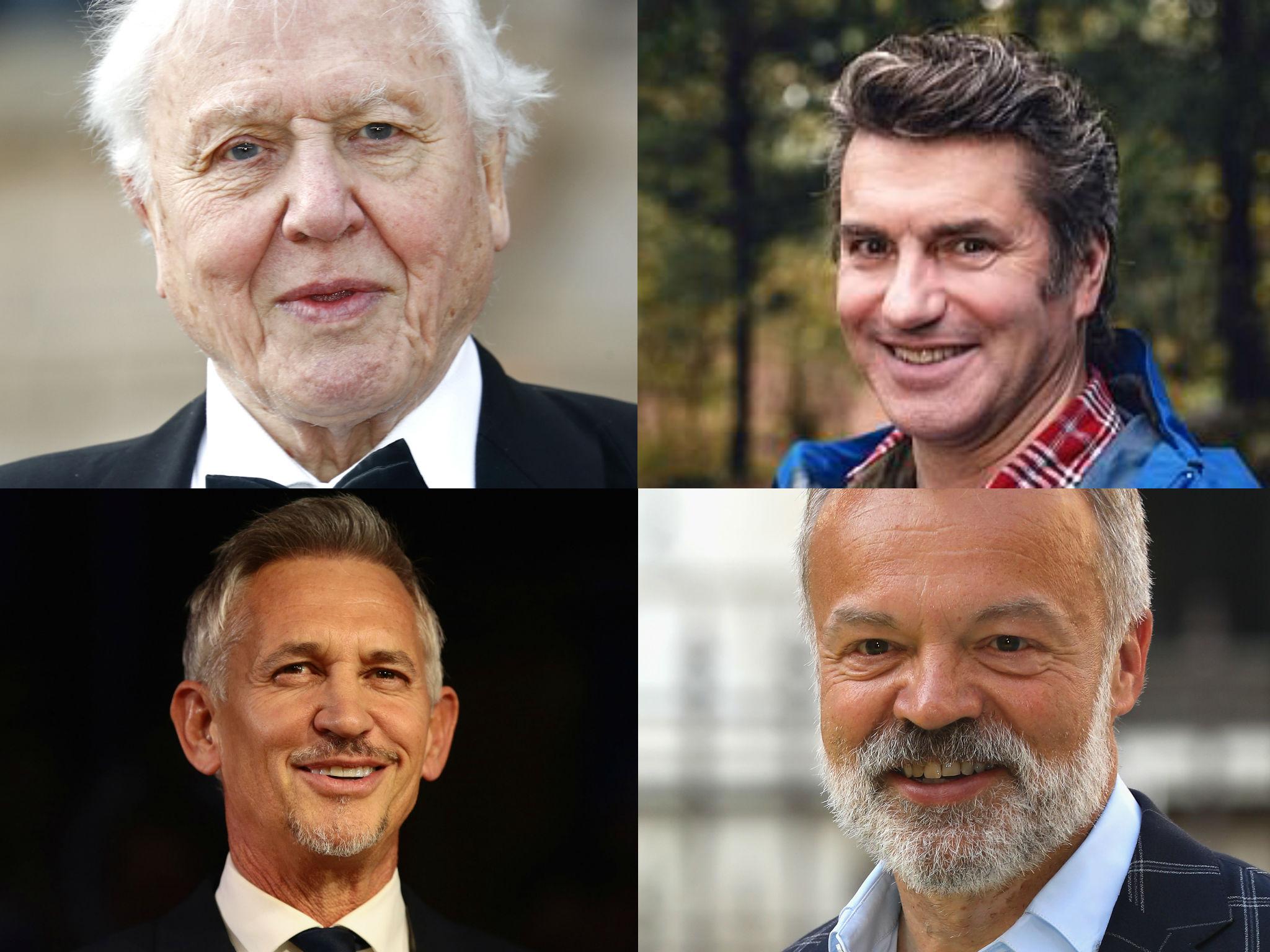Have you watched any TV recently? The white men of the media are hardly facing annihilation
In our latest arts column, Fiona Sturges takes former ‘Springwatch’ presenter Martin Hughes-Games to task for claiming that white men are an endangered species


Your support helps us to tell the story
From reproductive rights to climate change to Big Tech, The Independent is on the ground when the story is developing. Whether it's investigating the financials of Elon Musk's pro-Trump PAC or producing our latest documentary, 'The A Word', which shines a light on the American women fighting for reproductive rights, we know how important it is to parse out the facts from the messaging.
At such a critical moment in US history, we need reporters on the ground. Your donation allows us to keep sending journalists to speak to both sides of the story.
The Independent is trusted by Americans across the entire political spectrum. And unlike many other quality news outlets, we choose not to lock Americans out of our reporting and analysis with paywalls. We believe quality journalism should be available to everyone, paid for by those who can afford it.
Your support makes all the difference.Losing a job is no fun. I should know – I’ve lost a few. There was the waitressing gig which lasted five days, during which my inability to carry multiple plates at once led to endlessly upturned crockery and startled customers. Then there was the job on the cheese counter of a swanky department store where my dairy-related ignorance was quickly exposed. Over the years, other more serious roles have been lost due to cost-cutting or staff reshuffles. One’s immediate reaction is to feel wounded and look for someone else to blame. But as the dust settles, some perspective is usually gained.
I say “usually”. For 63-year-old Martin Hughes-Games, who lost his job co-presenting the BBC series Springwatch in autumn 2016 (he was later reinstated in a revised role until last year), perspective has proved elusive, despite him having landed a job hosting another nature programme on ITV. “I’m white, middle class, old-aged… who wants me on their show?” he carped in this week’s Radio Times, “I’m an endangered species. Let’s hope that conservation keeps me going, rather than going extinct.” In the same interview he noted how he missed his old colleagues and found Springwatch “very, very difficult to watch”. While I sympathise with Hughes-Games in pining for his old job, his imagined shift of the power axis – one that has apparently left the white men of the media facing annihilation – is more bewildering. Indeed, one might feel compelled to ask: Martin, have you watched any TV recently?
We are still operating in a broadcasting landscape where shows aimed solely at women – think Loose Women or Radio 4’s Woman’s Hour – have to be flagged up in the title, lest a male viewer stumble across them without due warning. Meanwhile TV drama remains overwhelmingly male both in its themes and casting. This week has brought us Channel 4’s anthology series I Am… , comprising three films starring Gemma Chan, Vicky McClure and Samantha Morton respectively, and which have been collectively described in the blurb as “female-led”. Are series in which women get top billing a genre of their own now? Or is this simply Channel 4’s way of awarding itself a gold star? Either way, I’d be intrigued to discover the last time the marketing team used the phrase “male-led”.
Equally worrying is the comparative scarcity of Bame faces on our screens, and the typecasting afflicting those actors that do break through. Idris Elba and Lenny Henry are among the black actors to have launched campaigns to combat inequality in the industry. In his brilliant new book I Never Said I Loved You, journalist Rhik Samadder describes his years trying to get his acting career off the ground when the only auditions he was offered were for terrorist dramas: “What would it be like if, every time a white English actor received a script, it always concerned the 1846 repeal of the Corn Laws? You’ll be playing an extremist farmer, hellbent on reviving the Napoleonic wars in order to push up wheat prices. Every single one. You’d understand if their habitual response was, ‘This again?’”
At the BBC, such inequality is at least being addressed. Talking at the Edinburgh Television Festival last August, Cassian Harrison, editor of BBC4, observed “a mode of programming that involves a presenter, usually white, middle-aged and male, standing on a hill and ‘telling you like it is’. We all recognise the era of that has passed.” Naturally, his comments triggered a fit of the vapours among certain (white, male) commentators apparently concerned that David Attenborough was about to be euthanised.
Attenborough lives on, of course, though this year we have also seen Zoe Ball and Sara Cox given prime-time slots on Radio 2, a network that has, over 50 long years, studiously kept women at arm’s length in daylight hours. Meanwhile, Newsnight now has an entirely female presenting team comprising Emily Maitlis, Kirsty Wark and Emma Barnett. There is still work to be done, however. The BBC’s annual plan for 2019-20, published in March of this year, revealed just 15.2 per cent of the BBC’s workforce were from Bame backgrounds, up from the 14.8 per cent reported in last year’s figures.
Women were revealed as filling 44.3 per cent of leadership roles, though a slightly different picture emerges when you look solely at the Board and Executive Committee, where men still dominate. Earlier this month, the BBC unveiled its highest earners, the top seven of whom are all white men, among them Gary Lineker, Graham Norton, Huw Edwards and Steve Wright.
In light of this, Hughes-Games’ bid to cast himself and his peers as a discriminated-against minority feels not dissimilar to the privately-educated former commodities broker-turned-MEP Nigel Farage complaining about the tyranny of the political elite. As the saying goes, “when you’re accustomed to privilege, equality feels like oppression.”
Yet still we must offer our compassion to the lesser-spotted white man, sitting pretty on his pension pot in late-middle age, suddenly relegated to a fringe figure in a business taking its first baby steps towards gender and racial equality. Pick up your placards and take to the streets, gents. It’s high time your voices were heard.
Join our commenting forum
Join thought-provoking conversations, follow other Independent readers and see their replies
Comments